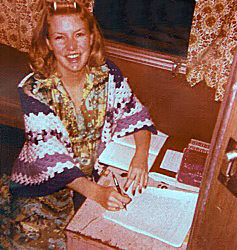How My Writing Journey Began
People are always asking how I became a writer, expecting, I fear, some mystical story. They also ask what inspires me, and tend to look disappointed when I truthfully reply, “The mortgage.”
You see, being a writer is a job like any other. You show up, go to work, and earn a check, which you only earn when your readers buy new books. (Used books don’t count).

But there is a necessary time of training, and not everyone has the patience to endure it.
I never dreamed of being a writer. Never fantasized about writing the Great American Novel, never dreamed of living in a garret and suffering for the sake of my Art. I’m a practical person, more focused on the nuts and bolts of things than the whys and wherefores. But apparently I’ve always had a natural aptitude for words and I’ve always been a reader (which, I’m sure, explains the love of words). So when a trusted friend suggested that I change my college major from music to English, the idea of working with words appealed more than singing for the rest of my life. I’d been doing that, you see, and my voice was tired and my suitcase worn out. Duct tape could only patch things up for so long . . .
So I graduated from college with a degree in English Lit, taught high school English for a year, then worked at a large church writing curriculum. I kept telling myself that when the time was right, I’d quit my job and actually become a writer.
 Writing for English class while touring with my college singing group
Writing for English class while touring with my college singing group My husband and I were waiting for children (we adopted ours) when I decided to plunge in. I quit the day job (not recommended unless someone else in your family gets a paycheck) and had stationery and business cards printed: freelance writer for hire. I mailed those cards and a brief letter to every advertising agency and magazine in my mid-sized town, then I was amazed at the responses. A great many business people, apparently, were happy to hire someone to write their letters, brochures, advertising copy, etc. I bought and studied books on how to write effective letters, brochures, and advertising copy, and set about establishing a reputation for being fast and dependable. I figured I might not be the most talented fish in the sea, but at least I could be prompt, professional, and diligent.
And I learned . . . from my employers and from my mistakes. For five years I worked for magazines and businesses, and I learned as I went along. I relentlessly studied books on the craft of writing. I rewrote and polished and rewrote again. When the children arrived, I tended to them and wrote during nap time.
In 1988, an artist friend and I entered a contest for unpublished children’s book authors. After studying a book on how to write children’s picture books, I wrote a manuscript. A few months later, I learned that out of 500 or so entries, our manuscript won first place–and first prize was publication. If I Had Long, Long Hair became my first book. At the same time, I was writing about my family’s experience with adoption and sold a nonfiction manuscript to a publisher. Those first books gradually moved me out of magazine work and into book publishing–after years of learning and writing and reading and studying. I am still learning and reading and studying, for each genre requires that a writer adhere to certain requirements.
So when aspiring writers ask me for advice, I tell them to read–a lot. I also advise them to subscribe to Writer’s Market. Study the periodicals market; study book publishers. Find out what they want to buy and concentrate on writing that–-if you want to sell your writing. If you want to write for yourself or for your loved ones, go ahead, write what is on your heart. But if you want to sell, you have to learn how to write professionally. You wouldn’t take out somebody’s appendix without learning how, would you?
Another wonderful place to learn is at a writer’s conference. There are many wonderful conferences around the country and throughout the year. Find one, go, and learn before you try to submit something to a publisher.
My philosophy is that a writer is like a builder–if you know how to use the construction tools and if you are familiar with the blueprints for various jobs/genres, you can master the work and write anything.But it requires study and basic know-how. If you’re interested, I’ve written a series of lessons designed to help you use certain writing tools. “Writing Lessons from the Front” are available here or online retailers. I’ve even produced a video course you can check out here.
Not everyone is called or wants to work alone, sitting at a keyboard, hour after hour, day after day. But if you are, start learning and keep at it while God opens and closes doors to take you on your writing journey.



